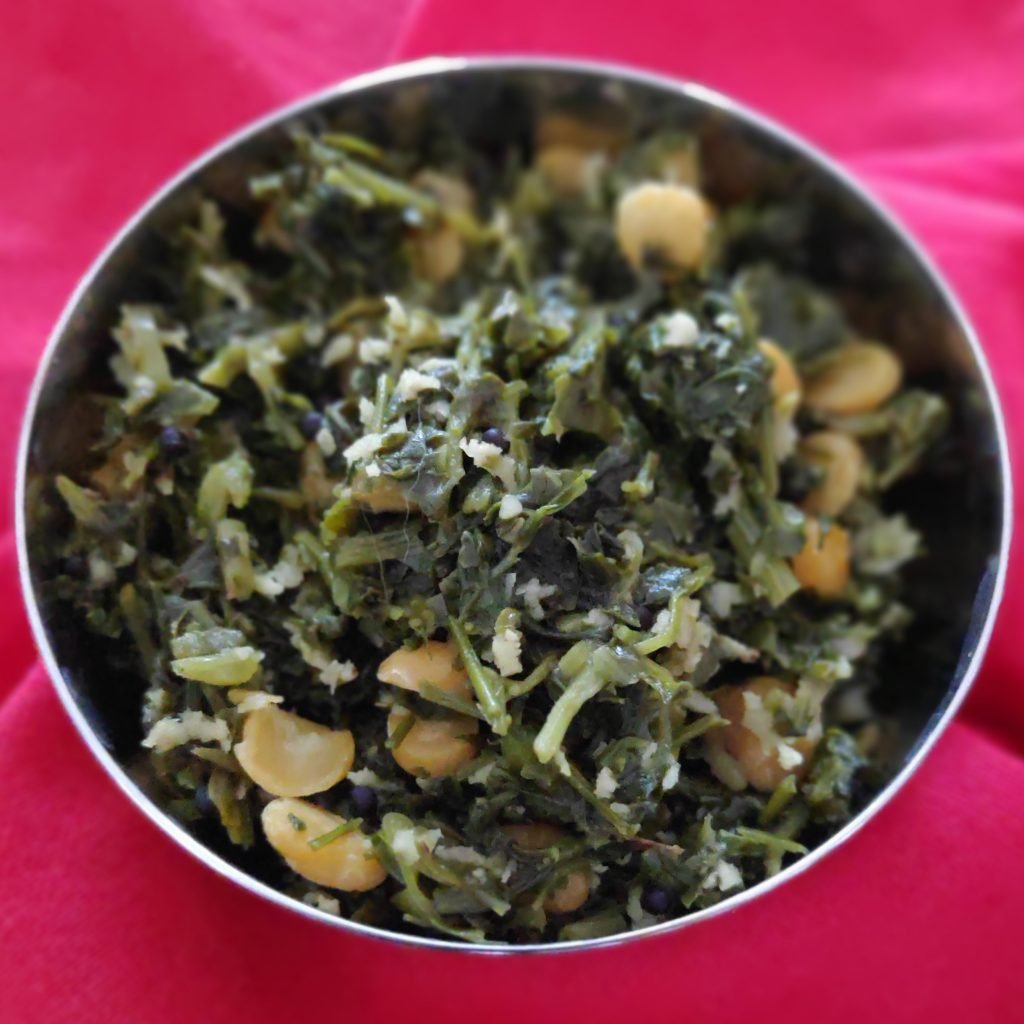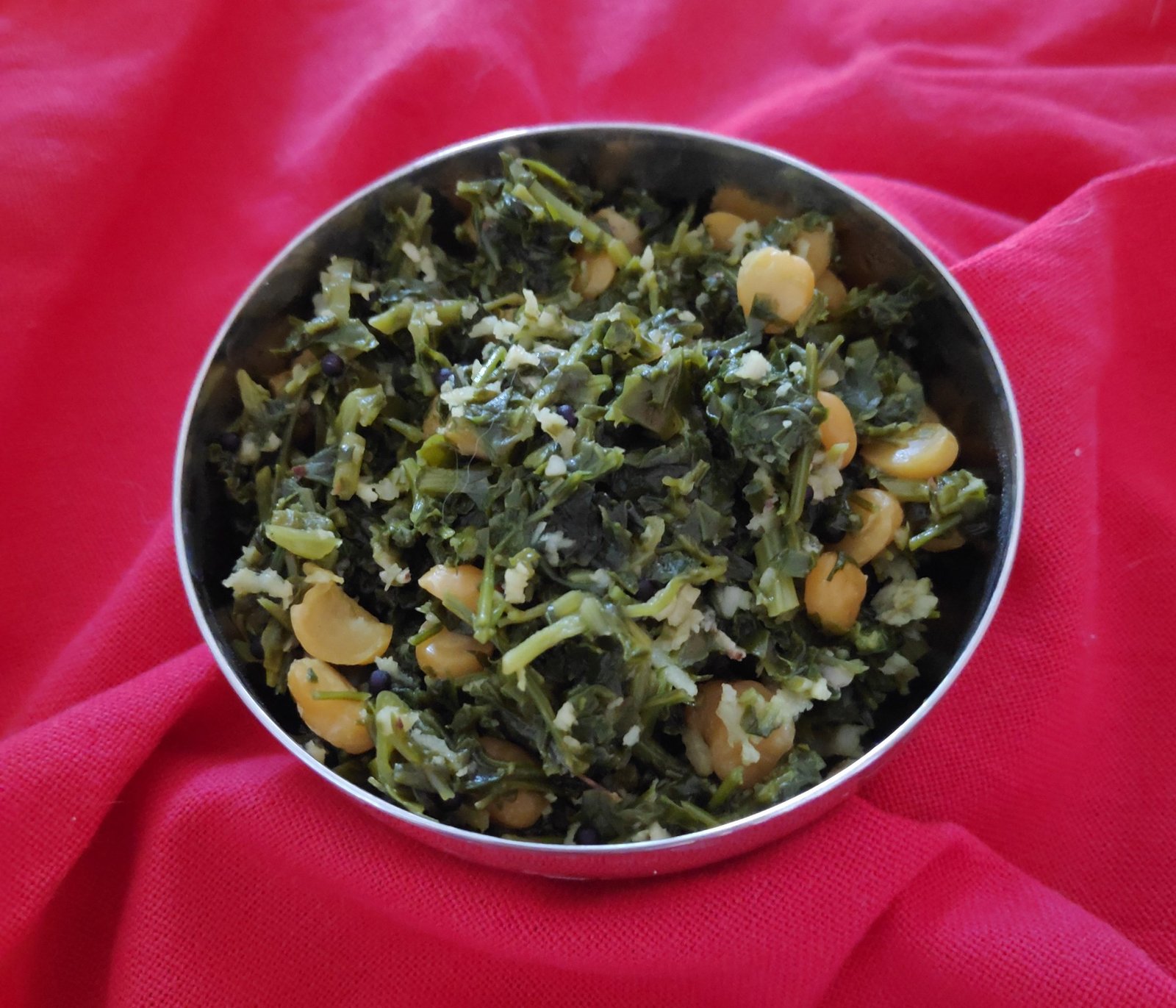Recipe credit: Darshana Muzumdar
Serves 4-6 people as a part of an Indian meal.
Ingredients
- 2 bunches methi leaves (fenugreek leaves)
- 2 handfuls of Bengal gram (channa dal)
- 1 tsp mustard seeds
- ¼ tsp asafoetida powder
- ½-1 tsp chilli powder
- 1 tbsp groundnut oil
- 1 tsp jaggery
- A handful of freshly grated coconut
- salt to taste
Method
Clean, wash and soak the bengal gram in enough water to cover it completely and a little more for around 30 minutes. Sort and clean the fenugreek leaves separating them from the stalks. Wash the leaves at least twice soaking them in the first wash for a few minutes and drain off the water. Cut the leaves fine, add salt and rub it well. This will release water from the leaves. Squeeze out the water and put the leaves aside in a bowl. This is done to remove the bitterness in the leaves. Rinse the Bengal gram and drain off any excess water. Heat a little oil in a thick bottomed steel pot and add the mustard seeds. Let them splutter and then add the asafoetida powder. Immediately add the Bengal gram and fry for a minute or so. Put in the fenugreek leaves and cover with a lid. Do not mix the Bengal gram and fenugreek leaves. The Bengal gram will absorb all the moisture released by the leaves during cooking. Cook till the Bengal gram is tender and the leaves are well cooked. Add the salt, jaggery, chilli powder and freshly grated coconut. Mix well and allow to cook for a few more minutes until all the flavors have blended. Serve hot with any Indian flat bread.
Note: Methi (fenugreek) leaves generally need to be fried in a little more oil and for a longer period to get rid of the bitterness in them. They retain the bitterness if not cooked well.
For the Whole-Food Plant-Based (WFPB) version:
Use unrefined or rock salt.
Do not cut the leaves as they will lose their nutrients, or if you wish to cut the leaves do not add salt to remove the moisture.
Put the soaked and drained Bengal gram into a thick bottomed steel pot. Add half a cup of water and bring it to a boil. Reduce the heat to low and cover the pot. Heat an iron tempering ladle and add the mustard seeds. Wait till they pop. Add them to the Bengal gram in the pot. Turn the heat down and add the asafoetida to the ladle and sauté for a few seconds till the asafoetida releases its aroma. Add this to the Bengal gram in the steel pot. Add a little more water if the water has evaporated and cook it till the Bengal gram is half cooked and then add the methi leaves. Cook on low to medium heat till the channa dal and leaves are cooked well. Add a little water to the pot if necessary to prevent the leaves from burning.
Use date or raisin paste instead of jaggery. Soak the dates for 2-4 hours if they are not soft before grinding to a paste with a little water. If you want to use raisins, make sure they are soaked for at least 4-6 hours before grinding them. Use the soaking liquid to grind both the soaked dates or raisins.

Share this:
- Click to share on Facebook (Opens in new window)
- Click to share on WhatsApp (Opens in new window)
- Click to share on Twitter (Opens in new window)
- Click to share on Pinterest (Opens in new window)
- Click to share on LinkedIn (Opens in new window)
- Click to share on Reddit (Opens in new window)
- Click to share on Tumblr (Opens in new window)
- Click to share on Pocket (Opens in new window)
- Click to share on Telegram (Opens in new window)
- Click to print (Opens in new window)

